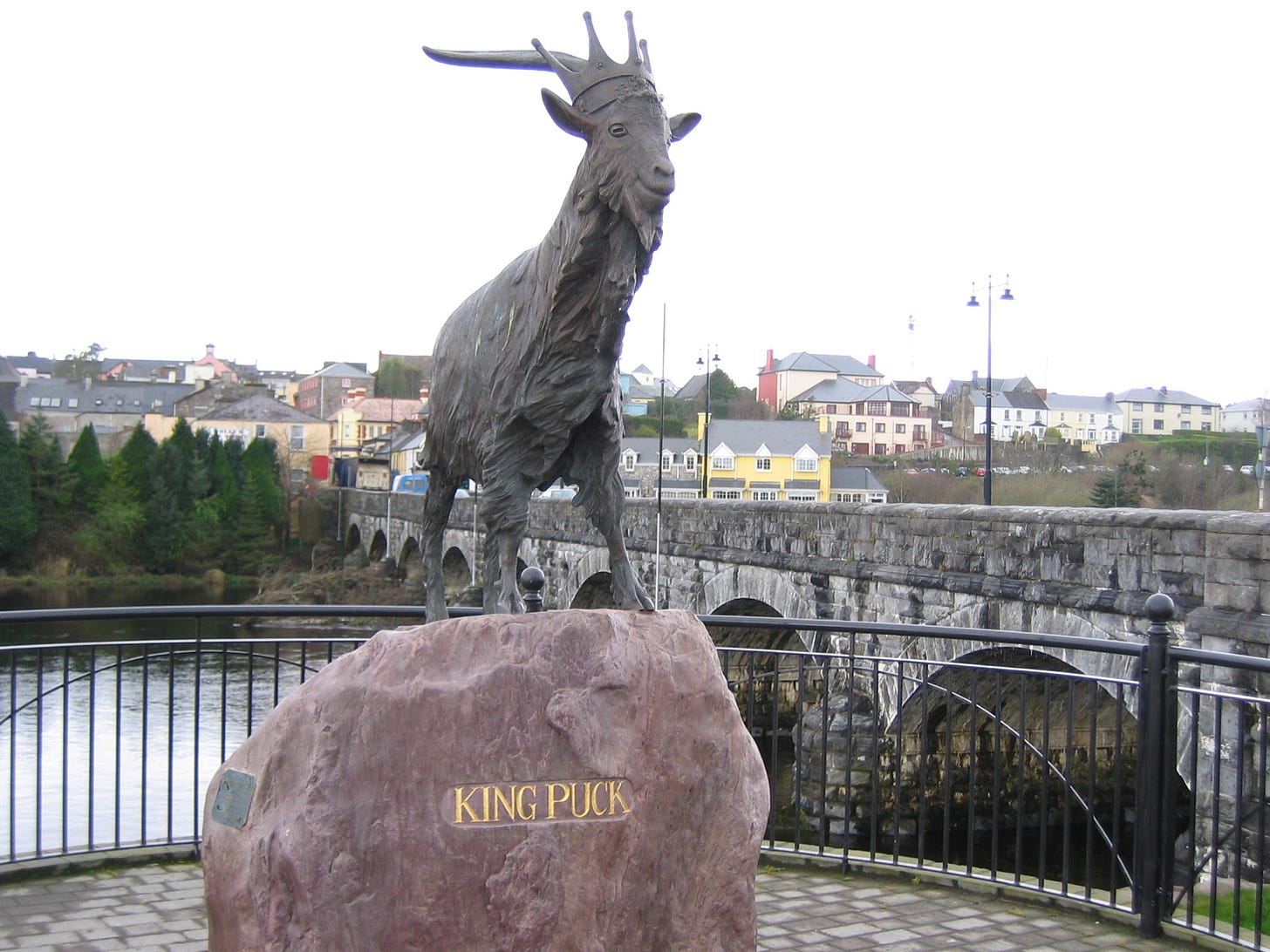From Invoking Ireland by John Moriarty
I had often heard it said that you can take the man from the bog but you can’t take the bog from the man. I was myself within three weeks of being ordained a priest and within three months of taking up a lectureship in Classics when, without warning, the bog won. That didn’t mean that I had bartered the Gospels for the Satyr play. What I told myself was that I must refuse definition. Not just definition by Christian collar and academic gown. All definition conferred or imposed by society, in splendid array, saying yes to itself. It all went back to a morning when I was fifteen. With our two sheep dogs, my father and my uncle and myself set off for the mountains and by three o’clock that day, the dogs having backed him into a shallow shaft at the base of a cliff, we had him, his horns flowing grandly back and up and out behind his withers, his beard flowing down below his knees, his nostrils so pretty I was ashamed of my own nose, his hooves so trim and so delicate that, certainly up here in these, his heights, I felt awkward and flatfooted. But that of course wasn’t all. There was a smell off him that would almost knock you, and by that alone we knew that we had found what we had climbed for, the bravest and grandest and most majestic wild goat of them all, and that evening, railed in at the top of a scaffold half as high as our high church, he was the newly inaugurated, crowned king of our town and king of the three-day fair, called Puck Fair, in his honour.
As I came out of a shop next day the sun came out from behind a thunder cloud and the shadow of the goat fell full upon me, so that for a dreadful instant his beard was my beard, his horns my horns, his hooves my hooves. Unarguably, the thing coming down upon me, unarguably for that moment, it was a destiny.
I fled from it, for as I saw things in those days, I couldn’t be both Christian and who I was. It was only at the expense of who I was that I could be a Christian.
Harshly, at the expense of who I was, that’s how I lived for the next nine years.
Listening to them morning, noon and evening, and thinking of them as heavenly hammer blows, I would lay myself open, as open as hot horse-shoe iron on an anvil, to all eighteen strokes of the Angelus, three followed by three followed by three then followed by nine in slow but determined succession, and that I would do in the hope that I might one day look up, on Judgment Day look up, and find myself acceptable in God’s eyes.
Three weeks short of consecration, without warning one night, I lost the fight. I came home, and in August on all three days of Puck, on gathering day, middle day and scattering day, I held my own with neighbours and strangers who came over to drink with me, not one of us so much as lifting his glass above the common secret, so well kept from ourselves, that we were drinking to the high good health of His Majesty crowned with rings and strings of mountain flowers about and upon his horns, and in its way that was a blessing because, so unlike early Greece in this, our myths were much too polite to sponsor what it was we were doing, they were much too polite to bring what it was we were doing out into the open.
It took me all of thirty years to come to terms with what happened to me in the sweet-shop doorway, and I only came to terms with it then because I saw it and welcomed it as a Christian destiny, pioneered and therefore sponsored by Jesus in Gethsemane. Instead of driving them underground, I attempted to live my instincts, from their darkest roots up I attempted to live them, into sanctity. I lost that fight too of course, but instead of giving up didn’t I one day stand unredeemed before God, and in some ways it worked.
By the time I was safe to live with and was again respectable, I was too old to get married.
So you have me now. Jimmy Lyne is my name. I live alone at the foot of the Reeks. I go to Mass every Sunday. And every year, come August, I go to Puck Fair, our festival, in our town, of being honest with ourselves and with God.



I missed the first sentence where you say this is from someone else's work, and I was beyond confused every single sentence through. Especially because I thought you were in California. I'm still not sure I understand what's going on, but it was a wild ride reading these few paragraphs.
Being honest with God about what it's like on the ground is the greatest gift we can offer Him.